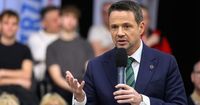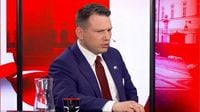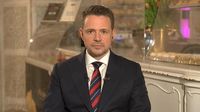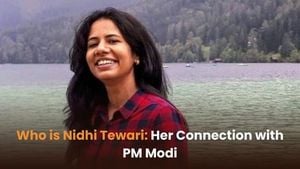In the ongoing presidential campaign in Poland, tensions are rising as candidates prepare for potential debates. Rafał Trzaskowski, representing the Civic Coalition (KO), has put forth a strong stance against his rival, Sławomir Mentzen of the Confederation, urging voters to critically assess the implications of supporting someone with Mentzen's controversial views.
During an appearance on TVN24's "Fakty po Faktach," Trzaskowski emphasized the importance of dialogue, stating, "Every girl should ask her partner if they really want to vote for someone with Mentzen's views." His comments come in the wake of Mentzen's provocative statements regarding various social issues, particularly abortion, which has sparked significant public debate.
Trzaskowski reiterated his readiness for a one-on-one debate, a format he believes is traditional before the second round of elections. "I mentioned in January that I am ready for a debate. It’s clear," he stated, highlighting the need for rational discourse focused on future plans. He criticized Mentzen's proposals, which include the elimination of the '800 plus' program, the 13th and 14th pensions, and imposing health insurance payments on all students, regardless of their financial situation.
As the campaign progresses, Mentzen has also expressed his willingness to engage in debates. He announced on Polsat News that he is prepared to debate not only Trzaskowski but also Karol Nawrocki. However, his previous reluctance to accept invitations from TVN has raised eyebrows. In a recent interview with Krzysztof Stanowski from Kanał Zero, Mentzen stated he would attend a debate organized by TVN if it were a direct confrontation with Trzaskowski.
Trzaskowski responded to Mentzen's challenge, asserting that whoever makes it to the second round will participate in a one-on-one debate. He emphasized the fairness of having one debate involving all candidates rather than selecting individuals from a larger pool. "If we wanted to debate one-on-one in every media outlet, why choose one person over another when there are many candidates?" he questioned.
Trzaskowski's campaign has seen a notable increase in young supporters, many of whom are eager to voice their opposition to Mentzen's views. He noted, "Young people are coming to my events in greater numbers to demonstrate their disagreement with Mentzen's proposals." This shift signals a growing concern among the youth regarding the implications of the current political discourse.
In a particularly contentious moment, Trzaskowski referenced Mentzen's remarks on abortion, where Mentzen claimed, "One must not kill innocent children, even if the child is associated with some unpleasantness." This statement has raised alarms among advocates for women's rights, prompting Trzaskowski to urge voters to reconsider their support for candidates who espouse such views. "Everyone should ask themselves if they really want to vote for someone who presents such views as Mentzen," he stated, emphasizing the need for a more compassionate and reasonable approach to sensitive issues.
As the election date approaches, the stakes are high. Trzaskowski has made it clear that he hopes any upcoming debates will be grounded in common sense and constructive dialogue. He expressed concern over the tone of the campaign, particularly regarding Mentzen's rhetoric, which he described as lacking in rationality.
The political landscape in Poland is becoming increasingly polarized, with candidates like Trzaskowski striving to present a more inclusive and thoughtful vision for the future. His commitment to engaging with the electorate and addressing their concerns stands in stark contrast to Mentzen's more controversial stances.
In the midst of this heated atmosphere, Trzaskowski's assertion that "everyone should open their eyes" resonates with many voters looking for a clearer understanding of the candidates' positions. His call for rational debate reflects a desire for a political discourse that prioritizes the welfare of citizens over sensationalism.
As both candidates prepare for potential debates, the question remains: can they rise above the fray and engage in a meaningful dialogue that addresses the pressing issues facing the nation? With the election drawing near, voters will be closely watching how these discussions unfold and what they reveal about the candidates' true intentions.
Ultimately, the outcome of this election may hinge on the ability of candidates like Trzaskowski to articulate a vision that resonates with the electorate while challenging the more extreme views presented by their opponents. As debates loom on the horizon, the political arena is set for a showdown that could shape Poland's future.






